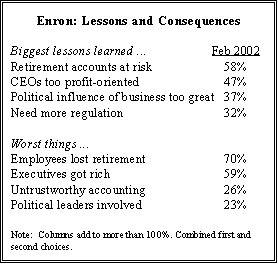Introduction and Summary

The American public increasingly recognizes the gravity of the Enron scandal — a greater percentage than in January has been following news about the case, and more now think the collapse of the Houston energy giant is of great importance to the nation. Yet the public’s underlying attitudes toward business and government regulation have been largely unaffected by the scandal. And there is no evidence of significant political fallout from Enron as of yet. Rather, the major lesson being drawn from Enron is that retirement accounts may be less safe than previously believed.
Even as the percentage of Americans paying some attention to news of Enron has steadily risen — from 34% in December, to 43% in January and 61% in February, basic opinions of American business have not changed much. While the vast majority of the public continues to worry about the power wielded by a few companies and many think corporations make too much profit, the public is divided, as in previous surveys, over the necessity of government regulation. The Pew Research Center’s latest nationwide poll of 1,199 adults, conducted Feb. 12-18, finds 50% saying such regulation is needed to protect the public interest, while 41% believe that government regulation does more harm than good. That is similar to the 48%-44% split on this question in 1999.
Most people continue to give mixed grades to American business for how it acts toward the public: as in previous surveys going back to the late 1970s, the vast majority (64%) express only some confidence in business to act responsibly, while just 12% express a great deal of confidence. Also, as in the past, relatively small minorities believe corporations put the interests of their employees, their customers or their communities first. But Enron seems to have changed the public’s perception of business’s top priorities — 43% now say corporations put the interests of executives first, while 37% say stockholders come first. In 1995, a plurality took the opposite view (46% said stockholders, 34% executives).

Enron has clearly affected the way Americans view the security of stock-based retirement accounts. A 58% majority said the major lesson of Enron was that such accounts may not be safe. That is a significantly larger percentage than say that Enron shows more government regulation is needed, or that large corporations have too much clout in Washington. The potential vulnerability of retirement accounts was an even bigger lesson for people with stock-based retirement accounts than for others in the survey.
Politically, most Americans see only venial sins arising from the Enron affair. Roughly three-in-ten (31%) think that Enron executives were able to influence Republican leaders a great deal; a smaller number (19%) believe they had sway with Democrats. Only about a quarter (26%) say that Enron officials exerted considerable influence over the White House. A 36% plurality says the Bush administration acted unethically, but not illegally, in connection with Enron, although the percentage who see illegal activity has risen to 24% from 15% in a late January Gallup survey. As in previous polls, an overwhelming majority say the White House should turn over information to Congress on energy policy meetings that involved Enron officials.
Bush: High Approval, Short Coattails

Nonetheless, the Enron scandal has shown no signs of diminishing the president’s standing with the public. The president’s approval rating remains at a lofty 78%, virtually unchanged from January, although down slightly from his fall ratings in the mid-80% range. However, the president’s approval measures are not translating into a partisan advantage for the GOP. Republicans continue to run even with Democrats in a congressional ballot test conducted among registered voters — 46% to 45%.
The lack of a major lift in voting intentions for the GOP also stands in sharp contrast to the fact that more say that President Bush will be a factor in their choice come Election Day than said that about former presidents Clinton, Bush or Reagan. Among the registered voters surveyed, 34% say that their vote in this fall’s midterm elections will be a vote “for” Bush, compared with just 9% who view their ballot as a vote “against” the president. This is a far better for-against ratio than enjoyed by other recent presidents.
But the president’s coattails may be less of a factor than these numbers indicate. An analysis of this attitude in relationship to voting intentions compared with four years ago finds that expressions of support for Bush have less connection to congressional preference than was the case with Bill Clinton. For example, one-in-five (19%) of those who say their midterm vote will be “for” Bush still intend to vote Democratic. Four years ago, just 7% of those who saw their vote as an expression of support for Clinton intended to vote Republican in the midterm balloting.
The findings of the poll also underscore some potential policy trouble spots for the Bush administration. Strong majorities favor increased spending for domestic priorities such as health care, Medicare, and education. Support for higher expenditures in these areas rivals the high levels of backing for boosting defense spending and funding of homeland defenses. When offered a choice of how to pay for defense and security needs, just 22% favor cutting domestic programs, compared with 42% who prefer to postpone or reduce tax cuts. Reducing domestic spending has appeal to some Republicans (33%), but even within Bush’s own party as many as 35% favor postponing or reducing the tax cuts.
The poll also finds the public reacting with cautious optimism to the first potential policy consequence of the Enron scandal. In the survey, conducted as the House of Representatives debated and passed a ban on “soft money” donations, just 51% expressed confidence that the president and Congress could write new laws that would reduce the role of money in politics. Still, this represents a significant increase from the 39% expressing that view at the outset of the last presidential campaign in February 2000.




